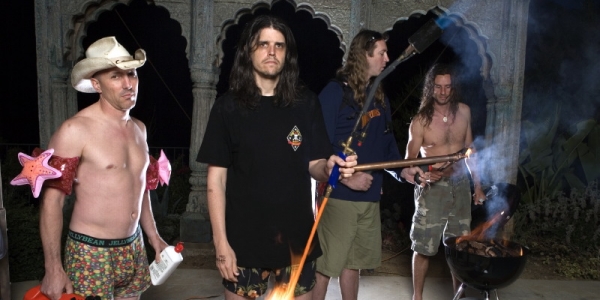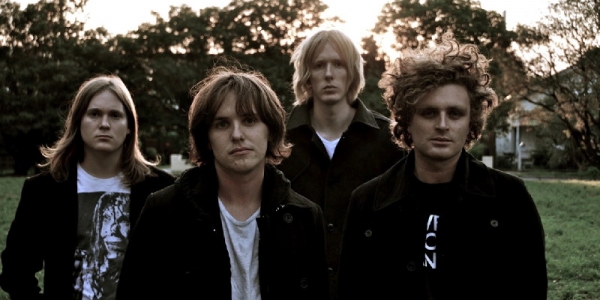Maynard, of course, is speaking from ‘the bunker’ (his studio located at his Caduceus Cellars) in Arizona. Foremost to his triptych of musical outfits, Maynard’s passion is winemaking. He has just completed the pre-filtering process and is about to commence the bottling process at the time of our interview. Such is the commitment to his vineyard, Maynard tours and records only when a break in wine season allows it.
“It’s more about being a slave to the sun and the rain. There’s a specific schedule that you’re on when it comes to harvest and processing, and making music can be scheduled around that because making music isn’t necessarily seasonal. It does flow with moods, that’s for sure. You can’t really force art. But with the wine, you’re definitely on a clock,” he muses. “It’s great. It’s nice to be in the midst of that chaos and navigate it wide awake.”
The music world has changed dramatically since the release of 10,000 Days, with the focus shifted from the commodity of the album to the commodity of the live show. Despite the current climate, we can still expect Tool to deliver in terms of the holistic album experience. “It’s funny, I grew up with vinyl and that was the medium, and of course there was the embarrassing thing called the 8-track too. But vinyl was the main medium,” Maynard reminisces. “But even back then, I remember looking at the 8-track and thinking, ‘This is kind of awful’, because you don’t get all the fun images with it. With the album you could have the double gatefold with all this extra information and images that leant themselves to what was going on with these particular songs, you could find out who wrote what, who performed what, who mixed what. It was always a nice complete package, literally and figuratively, with vinyl. I feel that, these days, that is missing with the iTunes experience,” he rues.
“Yeah it’s kind of tricky. The market definitely has shifted,” Danny assesses. “When we first got signed, we did live shows to sell the records. Now we do records to sell the live shows because there really isn’t that much money in record sales anymore. We still have the old school approach of making albums. From the beginning, we never did singles, only albums. We’ve always been kind of archaic in our approach to the system, and I think people are hungry for that. People can still sit down and listen to a whole record, and that’s how I picture our fans.”
“[The album and the tour] are still hand-in-hand depending on the project,” Maynard adds. “There are some people who make a living performing live, but there are definitely a lot of people that rely on their digital presence to pay the bills. I kind of find a happy balance of that with Puscifer. I think both points could be easily argued. My touring schedule is wrapped around my winery activities, or I just don’t tour at all. I put out things digitally, and I still do vinyl with all the projects because I just like that medium.”
Also included in Maynard’s current extra-curricular activities is the upcoming release of his biography. “If you read the Mötley Crüe biography, it’s what you would expect – craziness, hostility, drugs, breaking things, fun times. They’re not the biographies I end up getting into,” Maynard states. “I lean toward more story-oriented biographies. Not like a diary of sorts, those can be kind of boring. But I do find that the process is interesting in terms of legacy. You don’t want it to be airing dirty laundry, because that is boring. You want it to find the positive aspects and influences, then highlight those. I’m working with a writer friend of mine – I’ve known her for decades. She’s the older sister of one of my best friends from high school. We’re going through it and putting in all the information then sifting through it, working around it like you would a song.”
Tool’s fanbase is quite like no other, and as such, the intense fan-led discourse on Tool’s body of work is like no other. “I guess some of the best chefs in the world have many layers to what they’re presenting in front of you,” Maynard says in relation to the dissection of his work. “There are definitely nuances to what you enjoy in that dish, many layers and experiences depending on your palate. That’s what I gravitate towards – that execution of art in general – whether it be a chef, a winemaker, a painter, a filmmaker. I guess it would come naturally that I would want some of that represented in whatever I do.”
The upcoming Tool tour will see Maynard follow up Soundwave-oriented Australian appearances from A Perfect Circle and Puscifer. As for the rhyme and reason of his touring schedule, Maynard is typically wry. “I base it on my back. Whatever the back can take. Whatever set we’re constructing, whether it’s A Perfect Circle, Puscifer, or whatever it is I’m doing, you have to consider the age. Again the internet, people don’t realise what’s happening, and we’re quickly closing in on 50. We’ve been doing this for a while. That’s the danger with some of these projects, you see people out there, some ageing rock star trying to do the powerslide. It’s embarrassing, just don’t do the fucking powerslide. Do something else. Present your strengths, not your weaknesses. We’ve already heard about your weaknesses.”
It’s at this stage the phone operator interjects to state there is time for one more question. I ask Maynard if he thinks he is a funny guy. “I wish I was. I wish I was funnier. And the act of wishing that makes you not funny. I think there are people that have a natural timing and natural ability to be funny. I tend to think of myself to be more like the idiot radio announcer in Good Morning Vietnam who thinks he knows funny.”
BY LACHLAN KANONIUK







